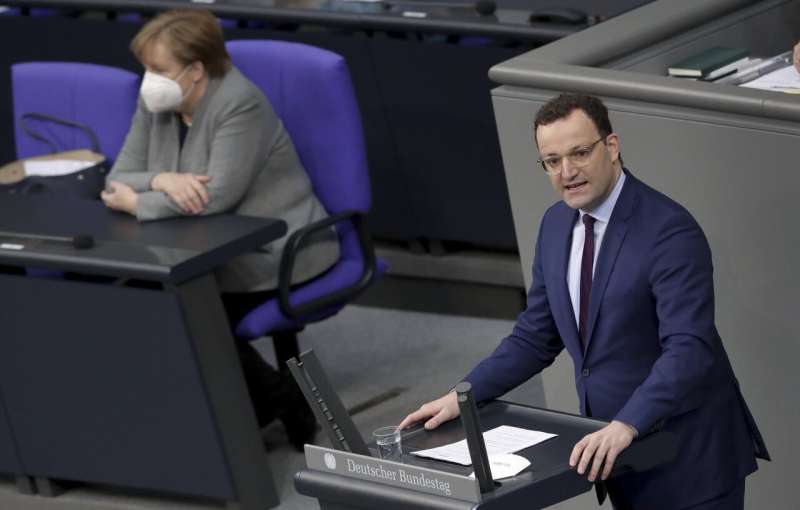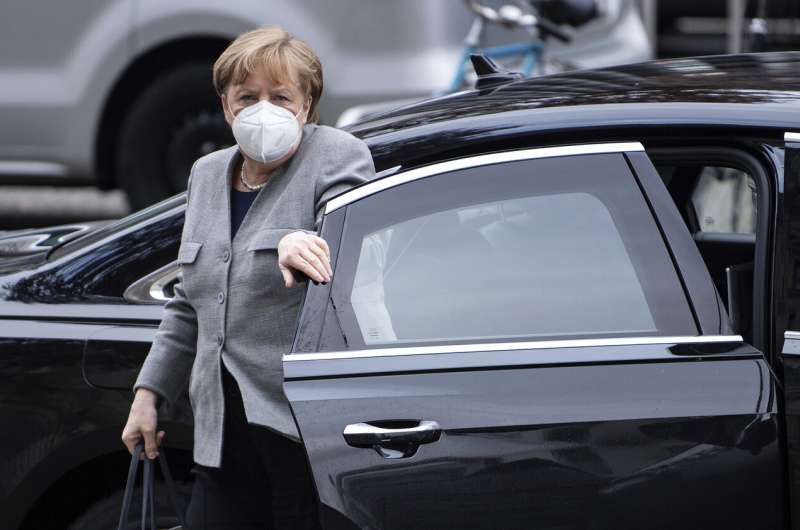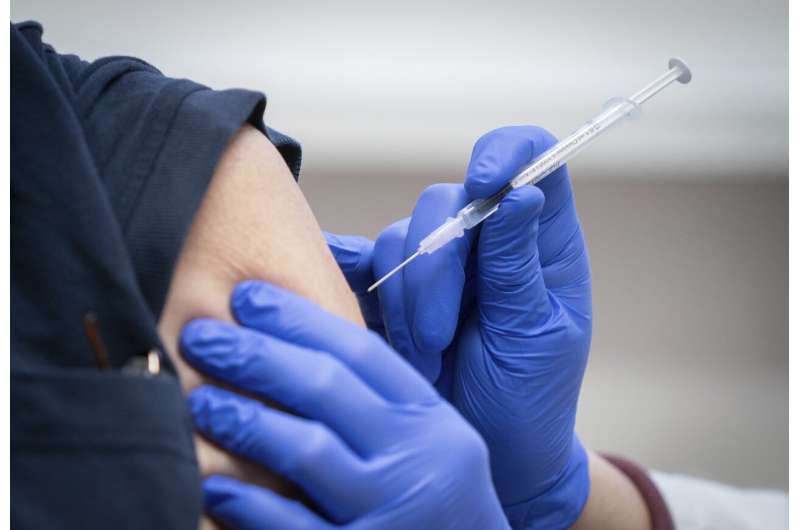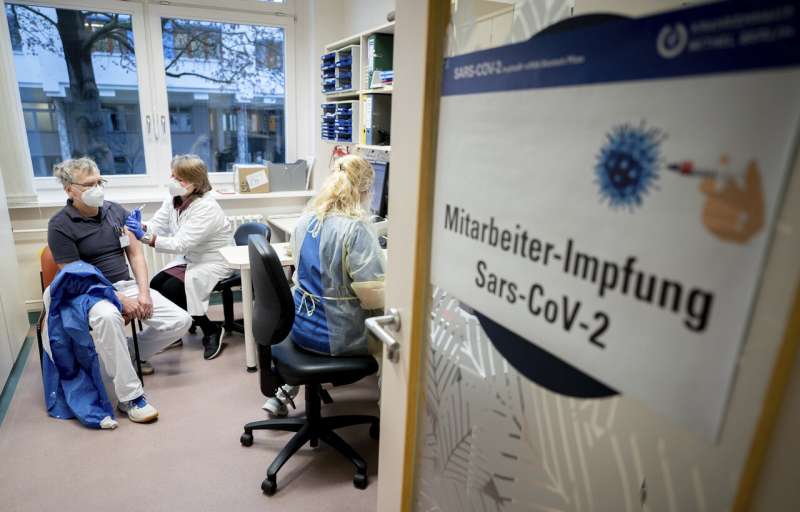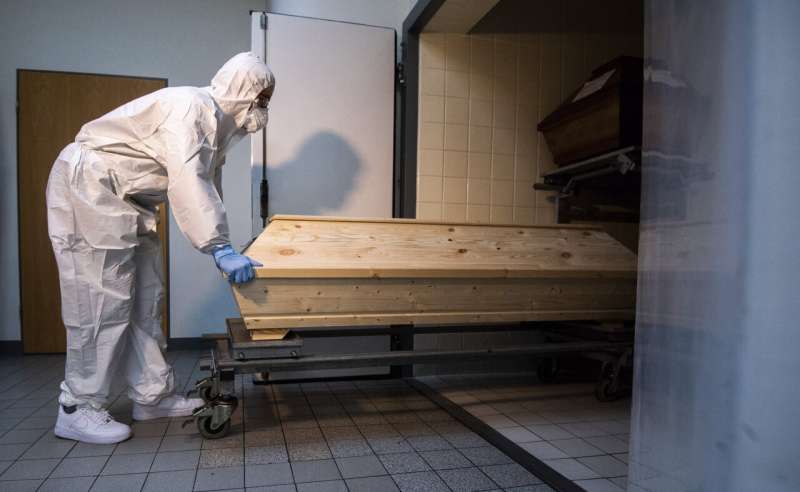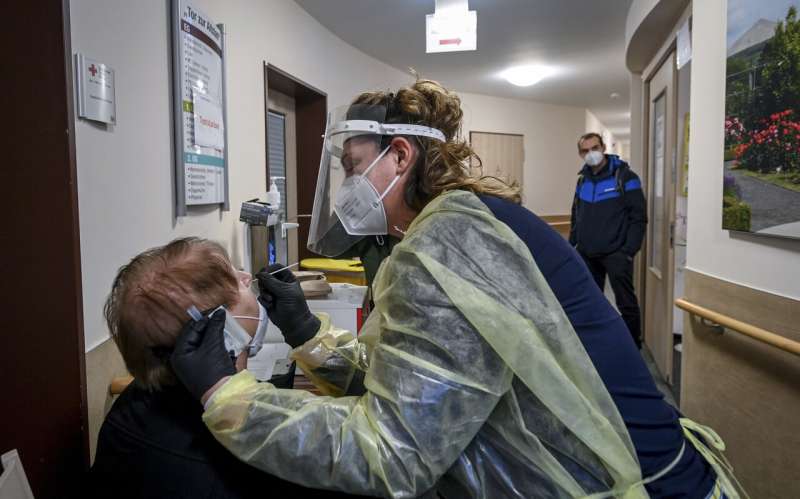German Health Minister Jens Spahn delivers a speech during a meeting of the German federal parliament, Bundestag, at the Reichstag building in Berlin, Germany, Wednesday, Jan. 13, 2021 on the current developments of the new coronavirus pandemic in Germany. At left is German Chancellor Angela Merkel. (AP Photo/Michael Sohn)
Germany's health minister on Wednesday defended the government's decision to procure and approve vaccines against the coronavirus along with the rest of the European Union amid criticism that the rollout of shots in the country has been too slow.
Noting that Germany depends on the free movement of goods and people across EU borders, Jens Spahn told lawmakers that it was a "question of economic sense not to vaccinate countries individually, but all of Europe."
While large countries like France and Germany could have gone it alone, smaller nations would have struggled to compete for the doses they need, sparking acrimony among the bloc's 27 members, he said.
"It was right to act as Europeans," Spahn said in a speech to parliament. "We mustn't just invoke Europe in Sunday sermons—we have to let actions follow words when it counts."
Spahn didn't mention that Germany has also signed bilateral contracts with vaccine makers, highlighting only the overall figure of 140 million doses expected to be delivered by BioNTech-Pfizer and Moderna this year. Germany has also ordered 56 million doses from AstraZeneca and more than 100 million from manufacturers whose vaccines have yet to be approved in the EU.
The EU required the vaccines to get regular clearance rather than emergency use permission, a decision Spahn said would help boost acceptance for the shots. But this delayed the start of the vaccination campaign compared to other countries.
-
German Chancellor Angela Merke arrives for the plenary session on the current developments of the coronavirus pandemic in Germany, at the parliament Bundestag in Berlin, Germany, Wednesday, Jan. 13, 2021. (Bernd von Jutrczenka/dpa via AP)
-
Nurse gives an injection with the Biontech/Pfizer vaccine against Covid-19 disease to an employee at the Bethel Hospital in Berlin, Germany, Wednesday, Jan. 13, 2021. A total of 66 employees will be vaccinated at the hospital with the first the Biontech/Pfizer vaccine. (Kay Nietfeld/dpa via AP)
-
Physiotherapist Christian Maass, left, gets an injection of the Biontech/Pfizer vaccine against the COVID-19 disease from doctor Marina Kremer, center, during the employee vaccination program, at the Bethel Hospital in Berlin, Germany, Wednesday, Jan. 13, 2021. A total of 66 employees will be vaccinated at the hospital with the Biontech/Pfizer vaccine. (Kay Nietfeld/dpa via AP)
-
Employee Niklas Grube pushes a coffin into a cooling chamber at the crematorium "Die Feuerbestattungen Celle", in Celle, Germany, Wednesday, Jan. 13, 2021. The crematorium in Celle has seen an increase in cremations of Corona deceased since November 2020. ( Julian Stratenschulte/dpa via AP)
-
Geriatric nurse Sindy Siegmund, center, tests a visitor at the entrance to the DRK nursing and care centre "Tor zur Altstadt" in Sangershausen, Germany, Wednesday, Jan. 13, 2021. Everyone who enters the nursing and care centre have to be tested on the coronavirus with a rapid test. (Hendrik Schmidt/dpa via AP)
Germany has so far administered shots to 750,000 of its 83 million residents, far fewer per capita than Israel, Britain or the United States.
Opposition lawmakers criticized that each of Germany's 16 states is organizing the vaccine appointments in a different way, with no centralized hotline or system to ensure that vulnerable groups are prioritized.
"I expect the federal government to be able to coordinate such an important matter with the states in a sensible way," said Left party lawmaker Amira Mohamed Ali.
Spahn said it was important to "remain realistic in the coming weeks," adding that Germans should expect to have to wear masks, practice social distancing and reduce their contacts for some time.
Senior government officials this week warned that Germany's lockdown measures may not be enough to reduce COVID infections before Easter, especially if the seemingly more contagious variants which have emerged in Britain and South Africa take hold.
The country's disease control agency reported 19,600 newly confirmed coronavirus infections in the past day, and 1,060 deaths.
© 2021 The Associated Press. All rights reserved. This material may not be published, broadcast, rewritten or redistributed without permission.
